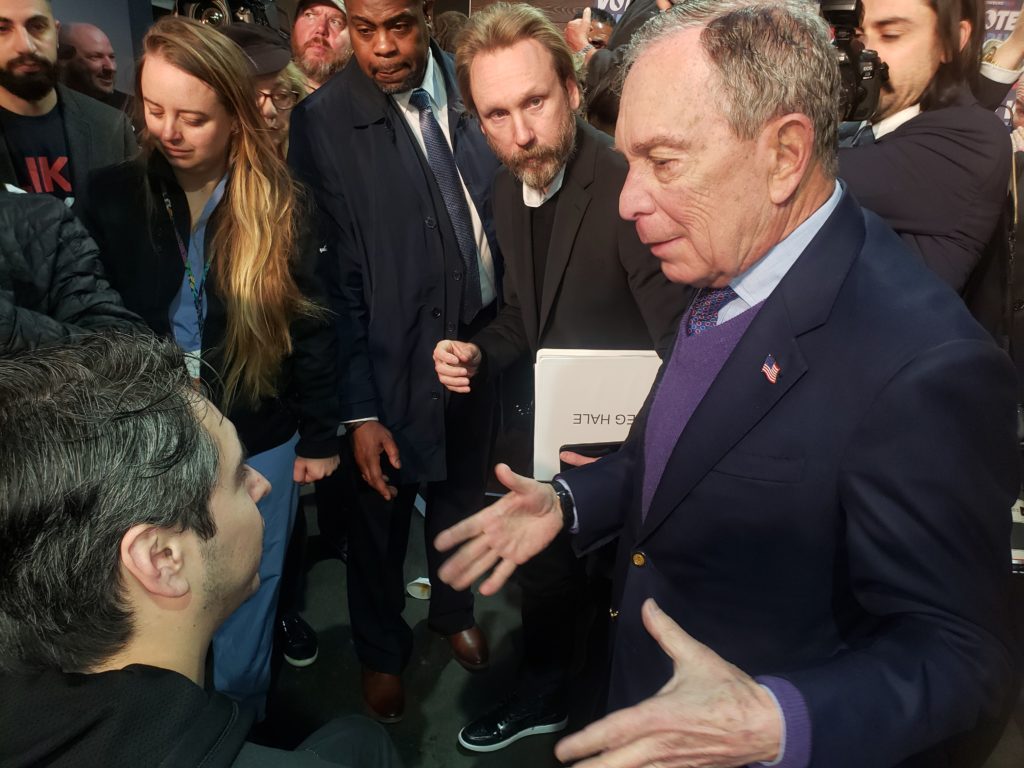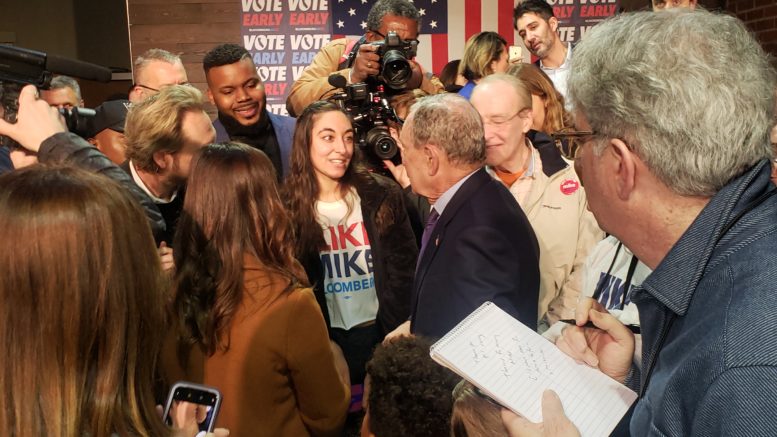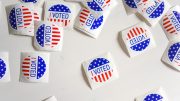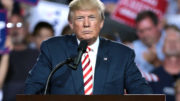Mike Bloomberg rises in polls after spending $450 million, but is counting on California to make him a real contender
By Stephen Magagnini
The morning after the Super Bowl, a trim, urbane gentleman in a navy blue suit and purple sweater vest entered Old Soul in Midtown Sacramento. By 7:30 a.m., more than 250 people had crammed into the popular coffeehouse to get a taste of billionaire Mike Bloomberg and his maverick “Rebuild America” presidential run.
After snapping off a quick Super Bowl joke – “no New York teams have won since I left office” – the former three-term New York mayor got down to business.
“We are living in very dangerous times and Mr. Trump isn’t the right man for the job,” he declared. “We have somebody as president who should not be there…I am not running against the other candidates, I’m running against Trump, and we’re going to beat him.”
Bloomberg mentioned climate change, homelessness and underperforming schools as problems he wants to solve. “Too many people have been left out, too many people don’t have a future,” he said with a slight New Yawk accent. “I can’t solve all our problems, but I can pull the teams together that know how to solve them.”
In 15 minutes, Bloomberg had won over many in the crowd, including a few Republicans.
Candice Harris, a 54-year-old human resources officer from Sacramento, said she voted for Donald Trump in 2016 because she never trusted Hillary Clinton, but added: “I don’t love Trump. I’m looking for another option, but Democrats haven’t offered anything better, they skew too far left, I don’t like the extremism.”
Bloomberg, she said, seems much more measured, even though she doesn’t like his “anti-gun” stance.
“He’s the only one that’s got the smarts to beat Trump,” said Warren Christiansen, 84, of Roseville, who had his own maintenance business and had been considering another billionaire, California’s own Tom Steyer, a hedge fund manager and philanthropist who has made battling climate change the centerpiece of his campaign.
“The problem with Tom is he can’t instill excitement, he doesn’t have the sharpness in his voice, the moxie that Bloomberg has,” Christiansen said. “I think I’m going to change my registration from Republican to Democrat.”
Bloomberg’s message also resonated with some older Democratic voters in the Sacramento audience on Feb. 3.
“He’s the only manager in the race,” said Fred Ladean, an 86-year-old lawyer from Sacramento who voted for Clinton. “The only two managers that became president, [Franklin D.] Roosevelt and [Dwight D.] Eisenhower, were great presidents. His strategy is brilliant. Everyone else is chasing chicken-feed states, while he’s focusing on California. The others are going to knock each other out.”
While Bloomberg is rising in the polls, voters in California, 13 other states and one territory on Super Tuesday next week will decide whether he’s a real contender for the nomination—or just a billionaire who blew a big chunk of his fortune.
Big spender
When Bloomberg announced his last-minute entry into the 2020 presidential sweepstakes Nov. 24, the New York Times declared the 78-year-old billionaire a long-shot with lots of political baggage, a long list of business entanglements, “a history of making demeaning comments about women and a record of championing law enforcement policies that disproportionately targeted black and Latino men.”
He has also been called eclectic and eccentric, and “gun-and-soda grabbing” by The Federalist, a conservative online publication. He tried to ban large sugary drinks in all public spaces in New York, earning him the nickname “Nanny Bloomberg” and a defeat in court.
But he has spent millions to boost gun control advocates across the country and helped them crush the NRA in its home state of Virginia, turning a red state’s legislature blue last November.
And his unconventional strategy to skip the first four nominating contests looks somewhat smarter after the Iowa caucus debacle, the close results in the New Hampshire primary and the struggles of former Vice President Joe Biden to consolidate moderates.
Bloomberg has pushed $35 million of his chips into California and its 415 delegates at stake on Super Tuesday, when fully one-third of all Democratic pledged delegates will be decided. He has hired more than 300 staffers and blitzed the airways and digital media with seemingly nonstop ads, declaring himself the “un-Trump.”
Nationwide, he has spent more than $450 million on radio and TV spots and online ads, touting his accomplishments, showing high praise from Barack Obama and vowing to save the nation from Trump and “his corrupt White House.”
According to a Washington Post/ABC News poll released Feb. 19, Bloomberg did as well as Biden and Sanders in a match-up with Trump: 50% to 45%.
Like Trump, Bloomberg is a billionaire, but his $60 billion came from his international media empire. He has pledged to spend whatever is necessary to defeat Trump—whether he’s the nominee or not. And his ads are as out-of-the-box as he is. In late January, ads featuring a rampant wildfire declared “Our Planet is Burning” and asked voters to tell him “where you think his money should go” as he plans his “next round of climate spending.”
That’s part of the fascination with Bloomberg, says Barbara O’Connor, a veteran Sacramento political analyst. “He’s an adult, he has experience and he’s putting his money where his mouth is, his own money,” she said.
It appears to be paying off.
As of Feb. 24, Bloomberg—who barely registered in the polls when he started—had jumped into second place in California, according to the FiveThirtyEight tracking of all polls. Sen. Bernie Sanders of Vermont leads with an average of 27%, but Bloomberg at 14% has vaulted past Biden (13%) and Sen. Elizabeth Warren of Massachusetts (12%) and even the surging former South Bend, Indiana Mayor Pete Buttigieg (11%), whose campaign has pledged to train thousands of volunteers in the Golden State. Sen. Amy Klobuchar of Minnesota was at 6%. And at 3% was Steyer, who has spent millions but not as much as Bloomberg, and who laid the foundation for his presidential run with an impeach Trump campaign.
As Bloomberg has risen in the polls, he has become a target for his Democratic opponents, who accuse him of trying to buy the nomination.
Sanders went on SiriusXM Progress radio to tee off: “He could simply buy the election with hundreds of millions of dollars of ads. That is wrong. That is the basic, fundamental problem of American society…Billionaires have extraordinary wealth and power over the economic and political life of this country.”
Bloomberg has also gotten Trump’s attention. For instance, on Feb. 13, the 6-foot-3 president tweeted: “Mini Mike is a 5’4” mass of dead energy who does not want to be on the debate stage with these professional politicians. No boxes please. He hates Crazy Bernie and will, with enough money, possibly stop him. Bernie’s people will go nuts!”
Bloomberg quickly hit back with his own tweet, replying to Trump that “we know many of the same people in NY. Behind your back they laugh at you & call you a carnival barking clown. They know you inherited a fortune & squandered it with stupid deals and incompetence. I have the record & the resources to defeat you. And I will.”
In another tweet, Trump called Bloomberg a “TOTAL RACIST,” citing his “stop-and-frisk” policy as mayor, but quickly deleted it when it turned out Trump had supported a similar policy.
Some have suggested “stop and frisk” could be Bloomberg’s kryptonite. The issue resurfaced on Feb. 11 when a recording of remarks he made in 2015 went viral on social media.
“Ninety-five percent of your murders—murderers and murder victims—fit one M.O.,” he said. “You can just take the description, Xerox it and pass it out to all the cops. They are male minorities, 16 to 25.”
He went on to say the city “put all the cops in the minority neighborhoods … because that’s where all the crime is. And the way you should get the guns out of the kids’ hands is throw them against the wall and frisk them.”
In response to the outcry, Bloomberg apologized again, saying that he took too long to understand the damage to African-American and Latino communities.
He has also collected endorsements from high-profile leaders of color, including London Breed, San Francisco’s first black female mayor, who has become the campaign’s African-American co-chairperson.
In a statement, Breed says she’s backing Bloomberg because he’s the “only candidate who has a fully articulated plan to improve the lives of African Americans,” which includes boosting black businesses and homeownership and investing $70 billion in “the nation’s most distressed communities.” She also said that he has the best chance of beating Trump “and ending his administration’s assault on the poor, on communities of color, on women and on common decency.”
Stockton Mayor Michael Tubbs—the nation’s youngest mayor and one of the first prominent African-American elected officials to endorse Bloomberg—is the campaign’s national co-chairman. He lauded Bloomberg’s “commitment to eradicating poverty and rebuilding the middle class so that every child in America has the same opportunity he had.”
Former Los Angeles Mayor Antonio Villaraigosa joined a number of Latino elected officials supporting Bloomberg. And State Treasurer Fiona Ma is his campaign’s Asian-American co-chairperson.
But will those endorsements be enough to convince rank-and-file Democrats in California and other states who will be voting on Super Tuesday?
Battered at debate
One factor for voters is likely to be how Bloomberg measures up against other Democrats during debates. Because he jumped in so late, he missed the first eight debates and made his first appearance in Las Vegas on Feb. 19.
It did not go well.
Bloomberg found himself in a nationally televised street fight he apparently hadn’t fully anticipated. While he has been portrayed as a tough New Yawker who won’t tolerate bullies, the other five candidates, led by Warren, worked him over on his stop-and-frisk policy and his comments and alleged mistreatment of women at his multibillion-dollar media company.
“I’d like to talk about who we’re running against: a billionaire who calls women fat broads and horse-faced lesbians,” Warren declared. “And no I’m not talking about Donald Trump, I’m talking about Mayor Bloomberg.”
She also demanded that he release female employees from non-disclosure agreements after filing complaints. Bloomberg was booed by the audience when he replied that none of the women accused him “of doing anything other than maybe they didn’t like the joke I told.”
Sanders and Buttigieg joined Warren in painting Bloomberg as an arrogant billionaire. “Mike Bloomberg owns more wealth than the bottom 125 million Americans. That’s wrong and that’s immoral,” Sanders said.
Bloomberg may have fed that critique with his answer about when he will release his tax returns. “It just takes us a long time,” he said. “The number of pages will probably be thousands of pages. I can’t go to TurboTax.”
Mostly, Bloomberg kept going back to the core of his message: He is a self-made billionaire who spends millions on philanthropy and Democratic causes.
While most pundits said Bloomberg struggled, he said the next morning in Utah: “Look, the real winner in the debate last night was Donald Trump.”
Bloomberg did not appear on the ballot in Nevada, where Sanders won the caucuses on Feb. 22 and cemented his place as front-runner. Bloomberg had another chance to debate Tuesday night before the South Carolina primary on Saturday, leading up to all-important Super Tuesday.
Pitching voters
As Bloomberg seeks to become the moderate alternative to Sanders, another criticism from some Democrats is that he’s an ex-Republican who switched parties.
But that doesn’t bother Pete O’Rourke, 63, a printer from Elk Grove, who backed Sanders in 2016 and who attended Bloomberg’s Sacramento event. “I really like Bloomberg’s demeanor,” O’Rourke said. “He’s very straightforward. He can bring the country together.”
No one interviewed at Old Soul had any problems with Bloomberg using his prodigious wealth to saturate the media landscape, saying he earned it and can spend it however he wants.

(Photo by Stephen Magagnini)
But he’s taking heat from some young people, including members of Davis Political Review, a student publication at UC Davis.
“I don’t like Bloomberg,” said Shelby Salyer, 21, of Temecula. “The only reason he’s moved up is because he can pour billions into the race, and he’s been a Republican.”
“We don’t need another billionaire in the White House,” added Michael Wheeler, 20, of Walnut Creek.
A straw poll of 15 staffers showed 9 for Sanders, 2 for Warren and 1 each for Buttigieg, Klobuchar, Rep. Tulsi Gabbard of Hawaii and undecided.
Bloomberg still has to engage young voters, like those in Davis “who love Bernie,” O’Connor said.
But she said that Bloomberg has been tested and “is the most likable” of the Democrats, despite his curt, matter-of-fact style.
And even if Bloomberg finishes third in California, he could still win the Democratic nomination, said O’Connor, who supports Klobuchar but says either a Bloomberg-Klobuchar or Bloomberg-Buttigieg ticket could appeal to moderate voters who will probably decide the presidency.
Before that becomes a real topic of conversation, however, Bloomberg has to “get it done” and win a sizable share of delegates on Super Tuesday.






Be the first to comment on "A billionaire buys in"